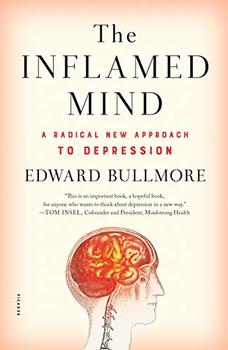Summary | Excerpt | Reviews | Beyond the Book | Readalikes | Genres & Themes | Author Bio

A Radical New Approach to Depression
by Edward Bullmore
We must dare to think differently.
One day in 1989, when I was training as a physician, just before I started to specialise in psychiatry, I saw a woman in her late fifties with an inflammatory disease called rheumatoid arthritis. I’ll call her Mrs P. She had been arthritic for many years. The joints in her hands were painfully swollen and disfigured by scarring. The collagen and bone in her knees had been destroyed so that the joints no longer worked smoothly and she found it difficult to walk. Together we talked through the long list of physical signs and symptoms that are diagnostic of rheumatoid arthritis. She ticked all the boxes. Then I asked her a few questions that weren’t on the standard checklist. I asked about her state of mind, her mood, and over the course of the next 10 minutes or so she quietly but clearly told me that she had very low levels of energy, nothing gave her pleasure any more, her sleep was disturbed and she was preoccupied by pessimistic and guilty thoughts. She was depressed.
I was pleased with myself. I thought I had made a minor medical discovery by doubling her diagnoses. She had come to see me with rheumatoid arthritis; I had added depressive disorder. I rushed to tell my senior physician this important news: “Mrs P is not only arthritic, she’s also depressed.” He was not impressed by my diagnostic acumen. “Depressed? Well, you would be, wouldn’t you?”
We could both recognise that Mrs P was depressed and she was inflamed. However, the conventional medical wisdom of the time was that she was depressed because she knew she had a chronic inflammatory disease. It was all in the mind. It did not occur to either of us that it might originate in the body. That Mrs P might be depressed – not because she knew she was inflamed – but simply because she was inflamed. Mrs P left the clinic no less likely to be depressed or fatigued than she was when she’d arrived. We’d not dared to think differently and we’d done nothing to make a difference.
About 30 years down the road, we are becoming much more fluent in a new way of thinking scientifically about the links between depression and inflammation, between mind and body, as I recently discovered for myself after a visit to the dentist.
Root canal blues
A few years ago I had an old filling in one of my molars that had gone rotten, become infected, and my dentist needed to drill out the cavity all the way to the tips of the roots of the tooth. Undergoing root canal surgery is not my favourite way to while away an hour or so but I knew it had to be done. I was cheerful enough when I obediently hopped up on the chair and opened wide. But as soon as it was all done, I wanted to go home, to go to bed and not talk to anyone. And when I was alone at home I found myself cogitating gloomily on the grave until I went to sleep.
The next morning I got up, went to work and forgot about mortality. I had endured some drilling of my tooth, some bruising of my gums, and I had briefly experienced some mental and behavioural symptoms: lethargy, social withdrawal, morbid rumination. You could say I had been a bit depressed: but – hey – who likes going to the dentist?
There seems to be nothing out of the ordinary about this sequence of events – and there isn’t – but the ordinary explanation for it turns out to be not the only one.
The traditional way of thinking about this tiny episode of illness starts with my body’s immune response to infection and injury. My tooth had been infected by some bacteria; my gums had become inflamed in response to that infection; the dentist’s drilling and scraping, although intended to achieve a long-term surgical cure, had the short-term disadvantage of making my gums even more inflamed and increasing the risk of the bacteria spreading from my tooth into my bloodstream. The reason I went to the dentist, and what happened to me when I got there, amounted to a challenge to my body’s integrity, a threat to my survival and a clarion call to my immune system to step up its inflammatory response.
Excerpted from The Inflamed Mind by Edward Bullmore. Copyright © 2018 by Edward Bullmore. Excerpted by permission of Picador. All rights reserved. No part of this excerpt may be reproduced or reprinted without permission in writing from the publisher.
Experience is not what happens to you; it's what you do with what happens to you
Click Here to find out who said this, as well as discovering other famous literary quotes!
Your guide toexceptional books
BookBrowse seeks out and recommends the best in contemporary fiction and nonfiction—books that not only engage and entertain but also deepen our understanding of ourselves and the world around us.